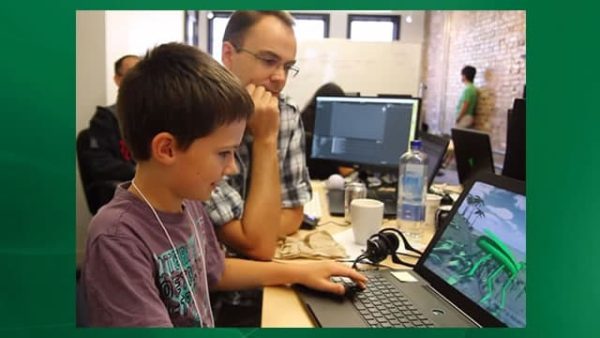Education professor examines increased use of video games in the classroom

At one time, news coverage centered on worries about video games’ negative influence on kids — but these days, they are making headlines because of the ways they are being used to help students learn. An avalanche of research supporting video games’ ability to encourage academic development has driven momentum on this issue.
Michael Thomas, UNC Charlotte educational leadership professor, studies the evolving relationship between education and games. He said the work of fellow researcher Constance Steinkuehler, associate professor of digital media, University of Wisconsin-Madison, sheds light on how video games help kids develop scientific habits of mind.
“Experts do not simply do something expertly. They share information with other experts. They trade ideas and strategies. They create tools to benefit the community of experts. They debate. They even fight. They collectively struggle to refine their skills and knowledge related to their expertise. This is true of gamers and it is true of scientists,” Thomas explained.
Despite their potential applicability, actually developing games for the classroom is accompanied by major challenges. Creating compelling programs is difficult and expensive.
“A good game that is educational should not have the look and feel of chocolate-covered broccoli,” Thomas said. Industry development could help make putting appealing games on the plate easier, making them more accessible to “clients of modest means and lofty imagination,” he added.
Some also still worry about potential connections between video games and violence. While the studies on the link between the two have yielded mixed results, Thomas said the issue is worth exploring further.
The emergence of video games as an educational resource is neither about exploiting new technology nor finding a way to connect with the next generation, Thomas noted. It’s about what school always has been about: learning.
“We shouldn’t try to muscle anyone into using any particular tool, and good games are good for learning not because kids like them,” he said. “Kids like them because they learn from them. Learning is inherently fun. It makes us feel powerful.”
Whatever the method, the empowerment of students begins with teachers, a fact which may also pose a problem for bringing games into the fold, especially for professionals who already deal with considerable regulation and evaluation.
“Teachers are under time and workload pressure, so it is difficult for them to get the training necessary to effectively use these technologies in the classroom,” Thomas said.
Yet it appears, as they always do, teachers are finding the time. Studies show that nearly 75 percent of kindergarten through eighth grade instructors use video games to teach.
Thomas said for a variety of reasons, schools are generally conservative institutions, and often resistant to change.
“Still, technology has a way of selling itself with little resistance,” he said.
Video games and immersive simulations may soon be solidly installed into the educational environment. Thomas said he could even foresee a future where systems become so intelligent that they could replace some professors and teachers. If that’s the case, how to configure classrooms might be the least of our worries, he added.